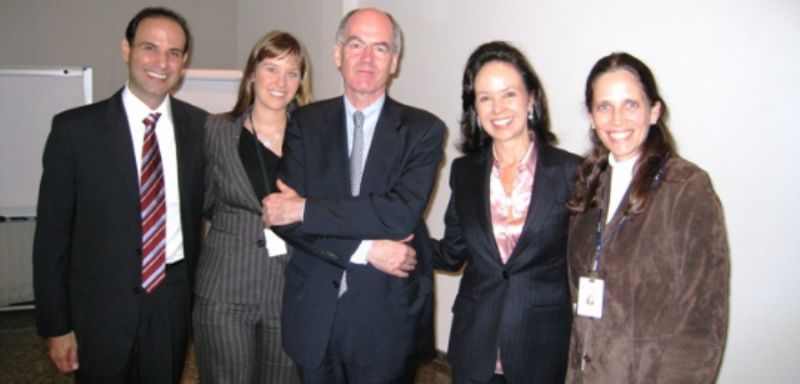Spoke at a lunch today hosted by Camargo Correa, a complex Brazilian group straddling areas like cement, construction, environmental engineering, textiles and footwear. Had met one of the shareholders, Renata Camargo Nascimento, a while back at an Alcoa Foundation event. With the aid of people like Carla Duprat and Ciro Fleury, she is encouraging the group down (or is it up?) the sustainability path. Among others, also met her daughter Luiza.
One of our challenges going forward, and particularly as SustainAbility does more work in countries like Brazil and India, will be to explore how best to help family-owned businesses like this. At least potentially, some of them could prove to have longer term time horizons than publicly listed companies.
As I left, Renata gave me a pack of information on Camago Correa – all contained in a large transparent bag, into which were inset a set of 12 flip-flops in different colours, symbolising one of their other businesses. And because the bag didn’t fit into my case, I carried it on top of my bags as I went through the airport later in the day. Remarkable how many people followed m pointing at the bag – and one very attractive woman even came up to me as I was about to go through security to ask me where I had got the bag? She wanted one, if at all possible. Felt as if I was trawling a succulently baited hook through the waters.
 Ciro Fleury, Luiza Nascimento Marques da Cruz, me, Renata Camargo Nascimento, Carla Duprat
Ciro Fleury, Luiza Nascimento Marques da Cruz, me, Renata Camargo Nascimento, Carla Duprat  Bait
Bait
One thing I signally failed to do in the speech, however, was to refer to a key project SustainAbility did recently for IFC. This report made the point that companies from emerging economies are increasingly making their presence felt in the global business community. Not only are they acquiring more and more companies in the developed world, but they are also pursuing strategies that are highly competitive with those of established businesses in western markets.
Market Movers: Lessons from a Frontier of Innovation explores whether such emerging economy firms are also managing to embed sustainability in their business strategies in ways that stand comparison with companies anywhere else in the world. It tells the stories of four firms ranging across the globe from Beijing to Sao Paulo – in many cases operating in some of the most challenging environments in which to foster commercial success – and how they have found business value in strategies based on sustainability.
The companies are: Amanco, a Latin American water pipe manufacturer that decided to develop a new water-tight technology and cater to low-income customers; Deqingyuan, an ambitious Chinese enterprise which supplies high-quality eggs in Beijing; Jubilant Organosys, an Indian chemical producer that has been able to reassure and attract investors with its high environmental, health, and safety record and efficient sustainability reporting; and MAS Holdings, a Sri Lankan apparel manufacturer that increased the retention of its mostly female employees by offering them benefits, including training courses in information technology. The company is now a supplier to some of the world’s leading retailers.
The report identifies a number of ‘ingredients of success’ – factors that contributed to the strong results in all four case studies and helped them overcome some of the constraints that many emerging-economy companies face. The five ingredients are :Leadership: the role of the chief executive or chairman in pushing through a strategy based on sustainability. Integration: the embedding of sustainability elements in corporate strategies from the very beginning. Innovation: using sustainability as a source of innovation. Differentiation: having the courage to be different. Quality of relationships: business benefits from strong relationships with stakeholders – suppliers, customers, employees.


Leave a Reply